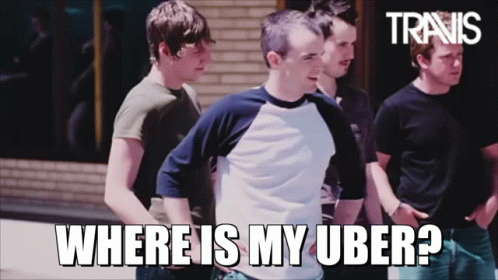☀️☕️ Gig Employees
📊 Also: More Bull; Unsweet Lollipop; UK mortgages; Nio cracks; China Property Gold; R-I-P CS 🎓 The STOXX 600

Happy Tuesday!
📝 Focus
Gig Employees
📊 In the Markets
More Bull; Unsweet Lollipop; UK mortgages; Nio cracks; China Property Gold
R-I-P CS
📖 MoneyFitt Explains
🎓️ The STOXX 600... which is not Europe's S&P 500

We ask for one small favour! 🤞🏻
Help us grow by sharing your referral link with someone you think would benefit from our newsletter: {{rp_refer_url}}
Thank you! 😊
You can also help our friends grow by visiting our recommendations here.

📝 Focus
Gig Employees
The EU member states have reached an agreement that could provide greater employment protection for their 28mn gig economy workers. Companies controlling workers' hours, what they wear at work, and who restrict whether they can accept or turn down work will need to classify workers now registered as self-employed as employees and bear additional costs like social security and other benefits like parental leave. The platform work directive is not yet a done deal: discussions with the European Parliament are up next, with an aim to sign it before Summer 2024. (Brexited UK is unique in having an intermediate “worker” category between employee and self-employed.)
.....▷ The definition of Uber drivers and Deliveroo riders as employees would have huge cost implications for the ride-hailing and food delivery platforms across Europe. Inevitably, the lobbying machine has been in overdrive in Brussels, with the companies stressing the need to make sure their workers have protections (which, if any had been provided in the first place, would have meant none of the above would have been needed) without being forced into employment and losing "flexibility and control."
..... ▷ The platforms run rating algorithms based on availability and consistency (cancelling or refusing rides), so drivers who switch too much between rival platforms the way we riders do (or get really lousy rider scores) get rated down and would eventually get "deactivated" off the system entirely. Worker advocates say that acting like a real independent contractor, free to take or refuse ride requests at will, is a quick way to get booted off the platform.
..... ▷ Over in the US, over 55 million people or a third of the workforce, are gig workers. Back in October, shares in Uber, Lyft, Grubhub and DoorDash absolutely tanked when the Labor Department proposed a similar new rule making it more likely that gig workers (now "independent contractors") will be classified as employees, massively increasing wage costs. The implication is that the platforms have built their businesses by exploiting an arbitrage opportunity in existing (some argue antiquated) labour laws since they could avoid minimum wages, overtime pay, and contributions to unemployment insurance and social security. And even then, they're struggling to make any profits at all (see MFM.)

Where is my profitability?
- Image credit: Travis (the band, not Kalanick) via Tenor

If you are enjoying The MoneyFitt Morning and would like to continue learning what's important in investing & business, please subscribe!

📊 In the Markets
More Bull: US stocks hit their highest levels since last April, powered by the same sorts of big tech names that have driven the rally since the bottom last October. Still way off the highs from the end of 2021 and the start of 2022, though. Traders are looking to a continued easing of consumer inflation pressures in a release later today and the Federal Reserve announcement on Wednesday, hopefully with the first pause of its 14-month death-match with inflation (and hopefully without too many dark signs of a recession.)
..... ▷ The oil price, sometimes seen as an imperfect barometer of global economic health, continued to weaken despite the recent unilateral Saudi production cut "Lollipop" signalling its intent to keep prices up and the extension of OPEC+'s reduced quotas. International oil benchmark Brent Crude dropped 4% to about $72 per barrel (bbl), close to recent lows and far below the $78/bbl range a week ago that was already deemed too low by the cartel. Traders are seeing continued supply strength from the US and Russia, as well as worrying signs of slowing China demand. Oil stocks traded down against the rest of the market, with both Exxon and Chevron off about 1%.

The one-week-old Saudi Lollipop is clearly not sweet enough
- Image credit: TradingView
UK mortgage chaos: Over in Europe, the region-wide STOXX Europe 600🎓 (which includes the UK and Switzerland, so is not just a €-zone index) closed 0.2% higher, led by France’s CAC-40 and Germany’s Dax, despite expectations that the European Central Bank will raise its deposit rate by another 0.25% on Thursday.
..... ▷ Meanwhile, across the Channel, chaos reigned in the UK mortgage markets, with more lenders, like Santander, withdrawing offers or, like NatWest, lifting their rates. The country's stubbornly high inflation is continuing to generate misery by driving up mortgage costs for borrowers. (April inflation of 8.7% was down from 10.1% in March, but still miles above the Bank of England's target of 2%.) The NatWest hike was mild for residential mortgages at 0.2% but rough on landlords, with two-year fixed deals for Buy-to-Let purchases increasing by nearly 1.6%. And there could be more to come.

Build it and they will come (or not)
- Image credit: Tenor
China's gold bar property market: Asian markets rose, led again by Japan's TOPIX up 0.7% as the run continues on expectations that The Bank of Japan will maintain its ultra-easy monetary policy when it meets later this week. Meanwhile, China’s CSI 300 and HK's Hang Seng Index were barely in the black. However, shares in EV names like Nio and Xpeng got a boost from Nio, giving into reality and cutting prices a month after the CEO said that Nio wouldn’t join the price war started by Tesla in a softening demand market and already waged by 40 other carmakers. Nio will cut prices by CNY30k for all models, or about 6% to 9%.
..... ▷ Elsewhere in China, local media report that gold bars, new cars and mobile phones are among the incentives being offered to potential homebuyers by desperate Chinese property developers to boost sales and get some cash flowing back into the coffers. The offers vary but could be up to 20% of the price of the underlying apartment. A decent start to the year for the property market, which makes up 20-25% of China's economy, has petered out much as the rest of the economy has, with the reopening boom proving pretty short-lived. Besides general economic weakness feeding into high youth unemployment leading to young people staying home for longer, there is the prospect of a property tax. This would provide much-needed income for China's massively indebted local governments but could be another reason for buyers to stay away and for the deep problems of the China real estate industry to drag on.
After 167 years, Credit Suisse is no more
On Monday, UBS completed its emergency, forced takeover of its local rival from across the road, Credit Suisse, ending its 167 years of independence. The closing comes after UBS finalised negotiations with the Swiss government over a guarantee of $10bn against possible losses on CS’s assets. Several top CS execs were axed within hours, leaving others to manage a challenging integration of the two firms that will likely include thousands of staff cuts and other major changes, including pushing UBS' corporate culture onto Credit Suisse's employees.

- Image credit: UBS
..... ▷ The combined assets of UBS and Credit Suisse based on March data was CHF1.285 trillion (US$1.353tn), making the enlarged UBS the sixth largest bank in the world by total assets, though by market capitalisation, it only ranks at about #24. More importantly, the combination will oversee $5tn of wealth management assets, making it the largest wealth manager in the world and giving UBS a leading position in all key markets. UBS and Credit Suisse have complementary strengths in different regions -- UBS is strong in Europe and the Americas while Credit Suisse is (was) strong in Asia.
..... ▷ UBS is set to book a massive second-quarter profit from rescuing Credit Suisse for only $3.25bn, a tiny fraction of its $60bn book value. In May, UBS said it expected to make a $35bn accounting gain, which is enormous but actually lower than the $57bn some had forecast since UBS is building in a discount to allow for asset value haircuts and litigation costs of $4bn. The accounting gain is known as negative goodwill that companies book when buying undervalued businesses. UBS made only $1bn of net profit in the first quarter, down 52% from the same period a year earlier.
Get Unlimited Access to Motley Fool Stock Advisor!

The Motley Fool helps millions of people attain financial freedom through our website, podcasts, books, and premium investing services.

📖 MoneyFitt Explains
🎓️ Stoxx Europe 600
The Stoxx 600 is usually seen as a European version of the US blue chip S&P500, but is actually drawn from large, medium and small companies across 17 countries, lots in the Eurozone like Germany, France and Italy, but also outside of it (and even outside the EU) as it includes companies from the UK, Switzerland and Finland.
The Euro Stoxx 50 is also well followed and is the blue chip version, but the 50 companies are only drawn from 8 Eurozone countries. ("Blue chips" are large, well-established and generally stable companies.)
It is calculated based on the market capitalisation of the company but adjusted for a number of factors such as free float (what's actually available for investors to buy and sell, and not locked up as "permanent" holdings by major shareholders.)
As is almost always the case globally, the index is a business and is maintained by a company (in this case Deutsche-Borse Group) and licensed to funds and forms the underlying benchmark for futures, options and a number of ETFs.
Stoxx was originally set up in 1997, so a much newer entity than most of the global indexes and their providers like S&P, Dow Jones (actually one of the original partners in Stoxx), Hang Seng, Nikkei and FTSE.





